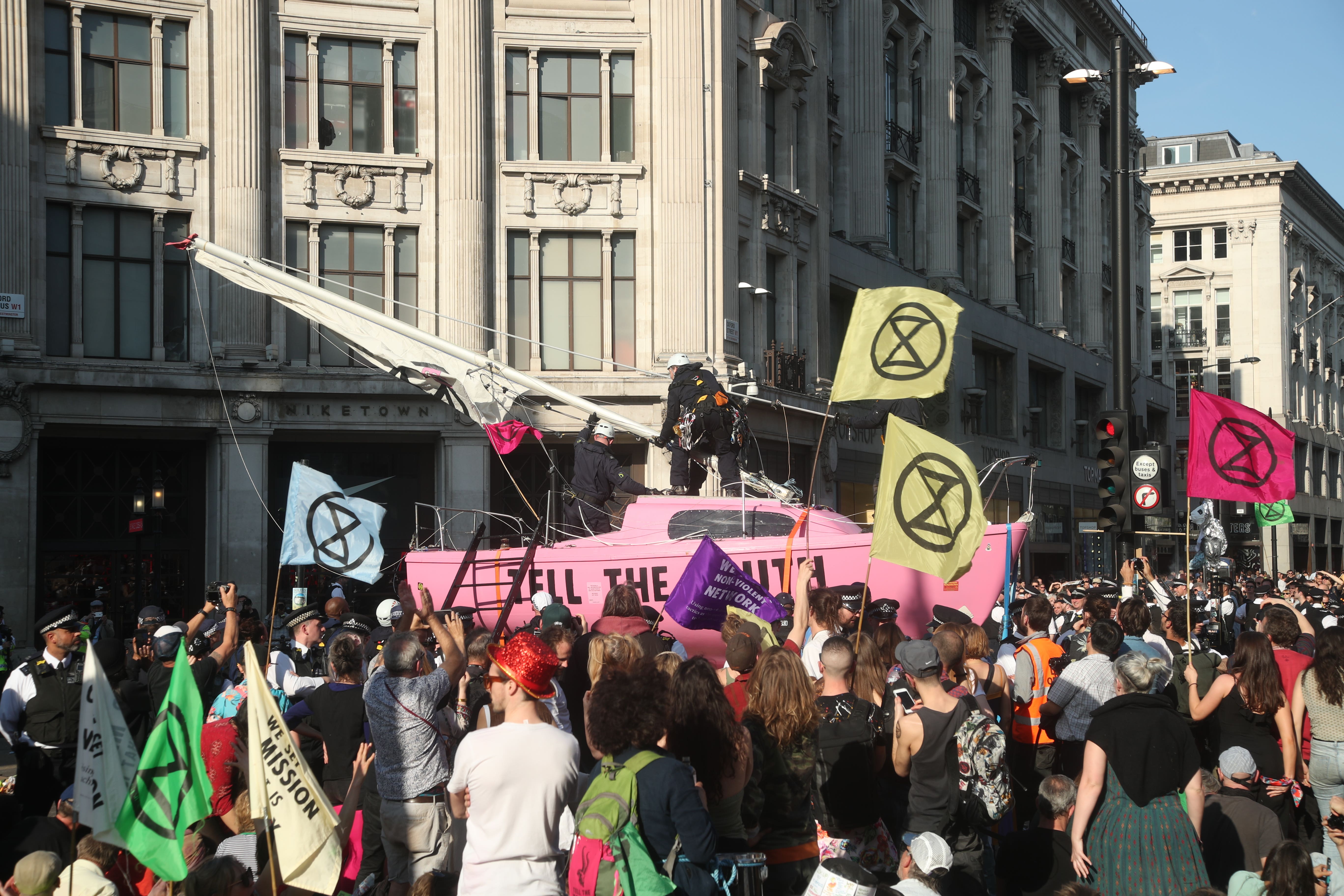Extinction Rebellion to ‘shift away from public disruption’ after year of divisive protests
Climate group says it will temporarily stop using public disruption as ‘primary tactic’

Your support helps us to tell the story
From reproductive rights to climate change to Big Tech, The Independent is on the ground when the story is developing. Whether it's investigating the financials of Elon Musk's pro-Trump PAC or producing our latest documentary, 'The A Word', which shines a light on the American women fighting for reproductive rights, we know how important it is to parse out the facts from the messaging.
At such a critical moment in US history, we need reporters on the ground. Your donation allows us to keep sending journalists to speak to both sides of the story.
The Independent is trusted by Americans across the entire political spectrum. And unlike many other quality news outlets, we choose not to lock Americans out of our reporting and analysis with paywalls. We believe quality journalism should be available to everyone, paid for by those who can afford it.
Your support makes all the difference.Extinction Rebellion says it will “temporarily” stop using public disruption tactics in 2023 after a year of protests that caused chaos on Britain’s roads, sparking angry clashes with motorists.
The group said it would continue to protest against the “abuse of power” by vested interests who it said were “addicted to greed and bloated on profits” but would stop using public disruption as a “primary tactic”.
Over the past year, hundreds of campaigners have been arrested during demonstrations by XR, which formed some four years ago to tackle what it said was the glacial pace of action by politicians in tackling the climate emergency.
Nurses, teachers and students were among XR protesters who took mass action by blocking roads across the UK in May. One man glued himself to Westminster Bridge, while Morgan Trowland, a 68-year-old civil engineer from Hackney, east London, glued himself to Tower Bridge.
Multiple arrests followed the coordinated protests, which XR described as the “Rebellion of One”.
The protests caused major traffic disruption on roads and motorways across the country, with reports that ambulances were among the vehicles caught in the gridlock. XR says it does not block emergency vehicles and in September released a statement setting out its “blue light” policy.
A man, who didn’t want to named, told the BBC that he was unable to get to his father’s bedside before he died because of an XR protest in Bristol in July. An XR activist later apologised to the man.
Making its announcement to postpone the protests, the group said that “despite the blaring alarm on the climate and ecological emergency ringing loud and clear, very little has changed. Emissions continue to rise and our planet is dying at an accelerated rate”.

XR said that this year it will focus on prioritising “attendance over arrest and relationships over roadblocks”.
In a statement, it said: “As we ring in the new year, we make a controversial resolution to temporarily shift away from public disruption as a primary tactic.
“We recognise and celebrate the power of disruption to raise the alarm and believe that constantly evolving tactics is a necessary approach.
“What’s needed now most is to disrupt the abuse of power and imbalance, to bring about a transition to a fair society that works together to end the fossil fuel era. Our politicians, addicted to greed and bloated on profits, won’t do it without pressure.
“We must be radical in our response to this crisis and determined in our efforts to address the climate and ecological emergency, even if it means taking a different approach than before.”
XR said that “thriving through bridge-building is a radical act” and called for 100,000 people to surround the Houses of Parliament on 21 April.
It said it was taking the step now because “multiple crises” have helped make this the “time to seize the moment”.

The activists believe issues such as the cost of living crisis and ongoing strikes may help to provide “a unique opportunity to mobilise and move beyond traditional divides”.
XR is hoping for cooperation between groups and movements, and imagines a large protest in Westminster where people could “stay for as long as you can”.
In its invite for people to join its protest in April, it said: “Surrounding the Houses of Parliament day after day in large numbers means we can leave the locks, glue and paint behind and instead demonstrate faith in a critical mass of people to create a moment that’s impossible to ignore.”
In the past year, XR campaigners have spray-painted buildings and protested outside the offices of companies with links to the fossil fuel industry. They also blocked the entrance to Lloyd’s of London in April to protest the insurance sector’s backing of the fossil fuel industry.
XR has said its protests are aimed at forcing businesses and politicians to act on the climate crisis. The movement was founded in the UK but has since spread across the globe.
The UK group said it has three aims: to persuade the government to declare a climate emergency, achieve net zero by 2025 and create a Citizens’ Assembly on climate justice.



Join our commenting forum
Join thought-provoking conversations, follow other Independent readers and see their replies
0Comments